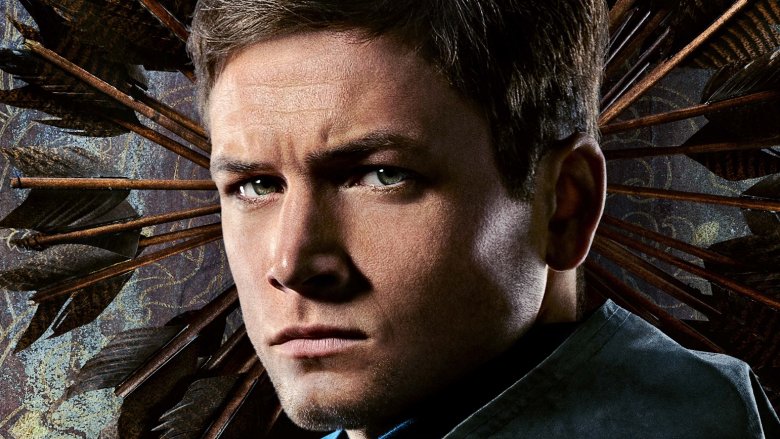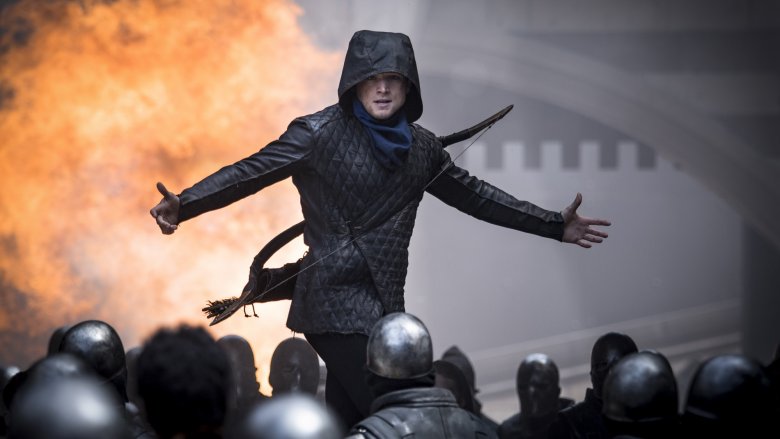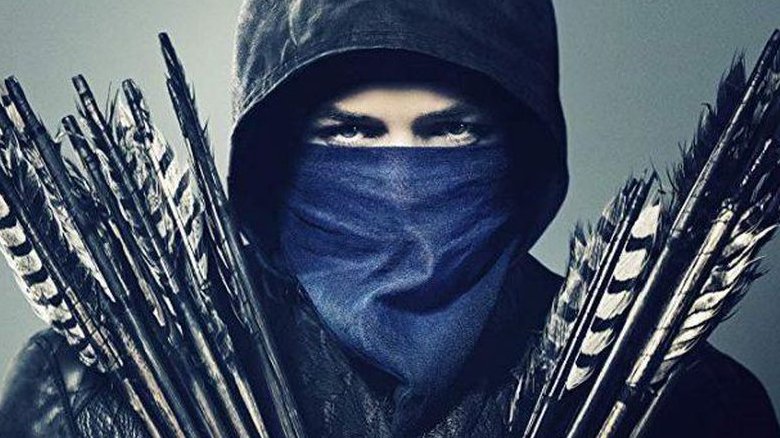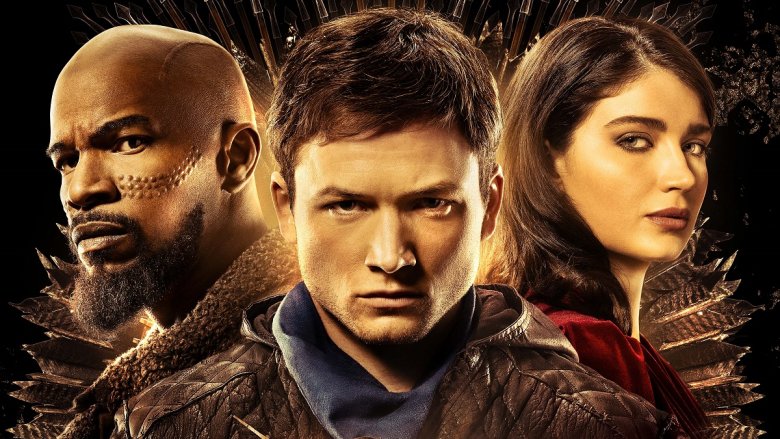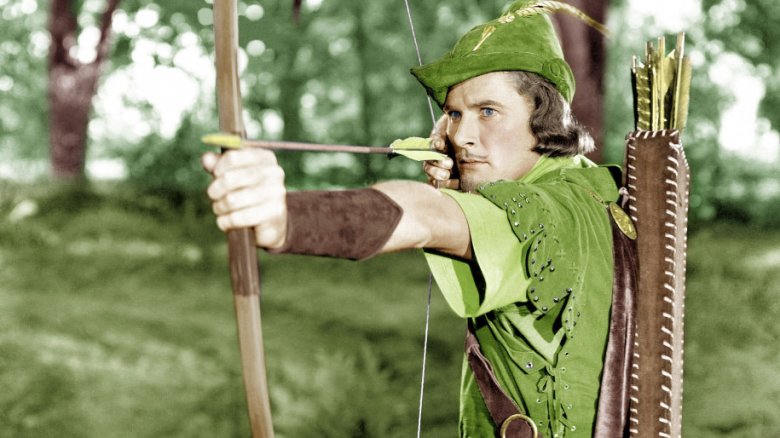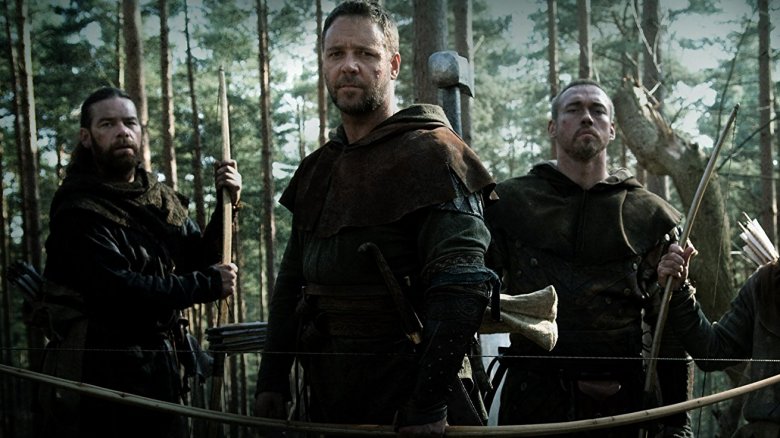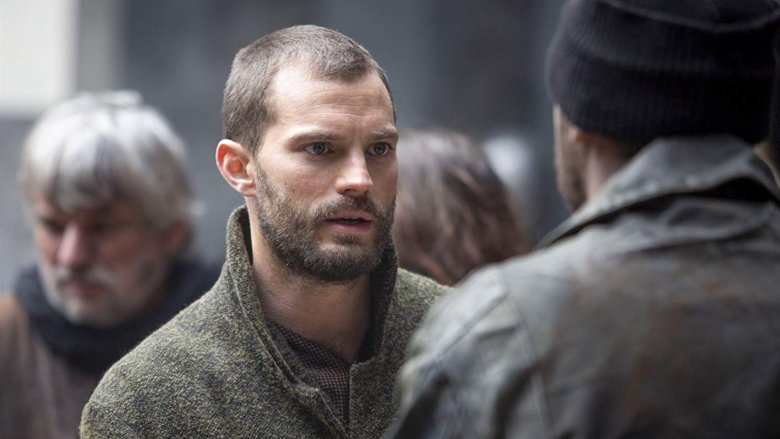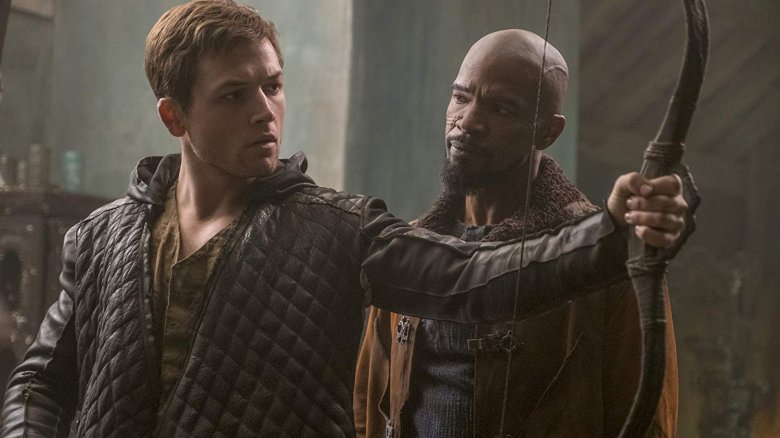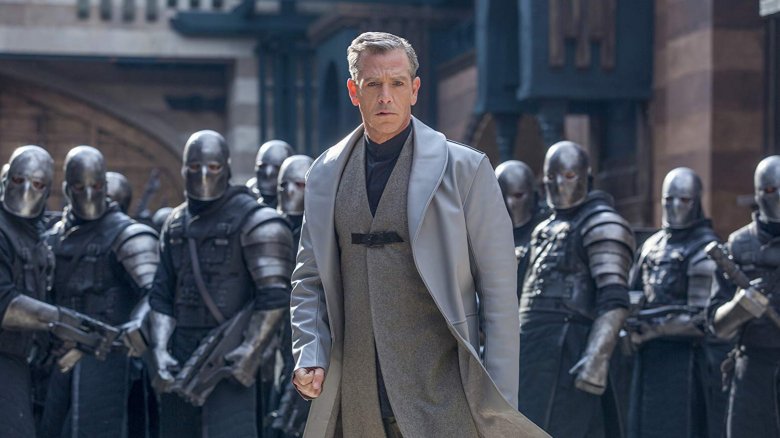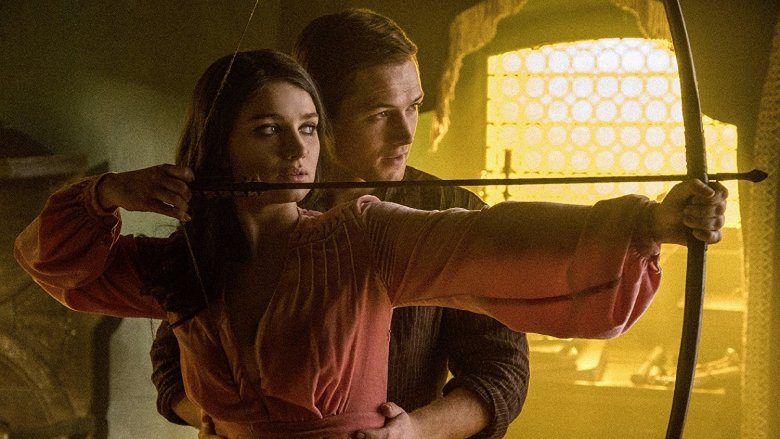Why Robin Hood Bombed At The Box Office
It's here, it's finally here — Robin Hood, the big-budget 2018 film sensation that nobody asked for, and that apparently nobody watched. The only surprising thing about the movie's flat-on-its-face failure is the fact that there are people behind this clunker who thought it was an idea worth pursuing to begin with.
Despite a charismatic cast, a big budget, and a sizable marketing push, Robin Hood is debuting as one of the worst box office bombs of the entire year. Even worse, its critical unpopularity all but guarantees a slow death for the movie over the weekends to come. What happened to make this Robin Hood reimagining stray so far from the target? What's the damage so far of its poor performance, and what could have been done differently? There are lots of questions around this mesmerizing misfire, so let's merrily break down the real reasons Robin Hood bombed at the box office.
New and... relevant?
Say what you will about the end result, but Robin Hood attempted to saunter its way back into the zeitgeist with style and flair. Starring Taron Egerton, Jamie Foxx, Ben Mendelsohn, Jamie Dornan, and Eve Hewson, the movie tries to tell a dark and gritty origin story along the increasingly tired lines of Batman Begins. From its very first trailers, it's been presented as an energized and revamped version of the old folk tale, all gussied up for a new generation — historical accuracy be damned. (As director Otto Bathurst has put it, "The film we made is very specifically not historically accurate, because the Robin Hood tale has been told over many centuries.")
The movie grasps for modernity from both a political angle and a filmmaking one, borrowing plot points and elements from the likes of Rocky and The Dark Knight. The violence is all hyper-kinetic and over the top, with automatic crossbows and super-stylish archery. Robin Hood himself is given an upgrade, too — while the outlaw figure has long been understood to be a champion of the common person, stealing from the rich to give to the needy, he's now presented as a badass Antifa supersoldier with a puzzlingly anachronistic wardrobe. "This ain't your father's Robin Hood," essentially. ("Or your grandfather's, or his grandfather's, all the way back to the 13th century.")
But all of these appeals to modern-day relevance appear to have totally missed the mark, with the movie falling flat on its face in its debut over the long Thanksgiving weekend.
Attempted robbery
No matter how you look at it, Robin Hood is getting off to a disastrous start, launching in its first weekend to the number seven spot at the domestic box office. It was a performance that brought in just over $14 million against a budget of reportedly close to $100 million, likely leaving some producers sweating bullets after the first weekend simply thinking about the numbers. With the movie having debuted on over 2,700 screens, that would seem to suggest a lot of empty theaters out there. Clearly, mistakes have been made.
Outside the United States, the state of things is equally dismal. According to Box Office Mojo, the movie only brought in around $8.7 million from foreign markets over its initial rollout, making for cumulative earnings of about $23 million by the Monday after its release. While there are still some countries that the movie has yet to open in, this is just a terrible start for such an expensive movie — and those are costs before marketing. Lacking positive word of mouth, it's hard to see how this misbegotten feature has a chance of ever making its money back.
The hard sell
If you're a casual viewer of broadcast TV, you were probably hit with a massive deluge of publicity for this new Robin Hood adventure over the lead-up to Thanksgiving. You're not imagining things if you feel the movie is being aggressively sold to you — Lionsgate, the film's distributor in the U.S., launched a robust TV commercial campaign, buying upwards of $8 million worth of advertising time for the feature over the course of just one week. (As the box office takes sadly suggest, this investment didn't really work on anybody.)
This reported high spending on ad buys would seem to indicate that the marketing budget for Robin Hood may be above the average for a release of its size. As a general rule of thumb, the marketing costs for a wide-release movie can generally be understood to be around half of the production budget. The numbers might be even higher than that in this case, especially with marketing campaign costs for the typical movie only having grown more ludicrously expensive over time. With all of these factors considered together, the movie's near-$100 million budget is only the beginning of this story. As things stand, Robin Hood would have needed to perform exponentially better in its opening days to have a chance of recouping all the costs.
Tale as old as time
It should go without saying that Robin Hood is not the first time the Robin Hood story has been adapted for the screen. (It's not even the first Robin Hood movie to see release in November 2018.) Though it was marketed with the tagline "The legend you know, the story you don't," the truth is simply that no, no sirs and ma'ams, this story is exceedingly well-known.
Indeed, the Robin Hood folk tale has been told in film and television literally dozens of times, to the point where even the most disengaged consumer of pop culture could probably rattle off the basic plot beats. ("Robin Hood has a bow and arrow, a green hat, and a badass crew. He lives and works in the vicinity of Sherwood Forest, robbing from the rich and giving to the poor. The cops hate him. There's a friar named Tuck, a maid named Marian, and a John who is little. They're all foxes, I think?")
How does one generate interest or excitement around a story that has been done to absolute death over the last 700 years? It's a good question, and one the producers of this effort clearly failed to crack.
Recent revival
But enough about Robin Hood. Do you remember... Robin Hood?
If this new take on the classic outlaw tale is ringing a little familiar in your ears, you might still be thinking about the blockbuster-budget adaptation of the story that saw release in 2010. Directed by Ridley Scott and starring Russell Crowe, that movie also explored the origins of the Sheriff of Nottingham's most famous foil, grittily reimagining the hooded archer as a hero for our times.
Despite built-in sequel teases and casual threats from Scott regarding a continuation of the story, a follow-up to that feature never materialized — and for seemingly good reason. While it made its money back at the box office, it hardly set the world on fire, with a $320+ million global take not being all that inspiring relative to a reported $200+ million production budget. (What's the point of using a public domain piece of intellectual property if you're still going to insist on 8-digit production budgets?)
Despite its impressive creative bona fides, the Scott-Crowe Robin Hood debuted to critical shrugs complementing its OK box office take. The fact that this version of the story wasn't able to generate traction for a sequel should have been telling, making it hard to feel sorry for the producers behind the 2018 version. Had they taken the temperature of the moviegoing public at all, you'd think they would have seen this new failure coming from a good ways out.
Low wattage
Robin Hood's stagnant performance at the box office can at least partially be attributed to a lack of interesting star power. Director Otto Bathurst reportedly waited a year for lead actor Taron Egerton to become available for this reimagining, but despite the actor's talents, one wonders why this particular casting preference was considered to be so crucial. Speaking to the Courier Mail, Bathurst justified the choice by saying, "I wanted to find someone who was accessible and who seemed real, and Taron is that guy. He is incredibly charismatic and charming, but he also has serious intensity."
Despite a relatively solid critical track record, Egerton has never proven himself to be a huge draw in a lead role, notwithstanding the success of the Kingsman movies. Despite technically being the protagonist of those films, based on a series of comic books by Mark Millar and Dave Gibbons, Egerton's role in the franchise has generally been but one small part of a more famous ensemble.
This includes the marketing campaigns of both movies, which each generally de-emphasized Egerton's presence — not because there's anything wrong with him, but more because names like Colin Firth, Julianne Moore, Halle Berry, and Samuel L. Jackson are considerably more popular, as far as known quantities are concerned.
Competitive release
From the marketing, Robin Hood would seem to have all the makings of some "good enough" entertainment that could conceivably have coasted to modest success in a less crowded, less competitive environment. In other words, there is a world and a release window in which Robin Hood could have turned in a respectable performance, and that release window is probably something like "a barren weekend in January." But that's not what happened here. Instead, Robin Hood made its debut during one of the most packed release frames of the whole year — and for its troubles, it got trampled.
By the end of the Thanksgiving holiday, Robin Hood had been beaten into submission by a cross-section of movies ranging from family entertainment to mid-budget comedy to franchise blockbuster. Coming in at number one over the weekend was Ralph Breaks the Internet, the Wreck-It Ralph sequel that stomped its competition with the second-best Thanksgiving opening ever. Below that, the Rocky series continuation Creed II debuted in the number two position, followed by The Grinch, the Fantastic Beasts sequel, and the Queen biopic Bohemian Rhapsody, all holding on to respectable numbers weeks after their debuts.
Robin Hood was even bested by the Mark Wahlberg comedy Instant Family, holding onto sixth place in its second week. If this pomp and spectacle couldn't beat that, what hope did it ever have of beating Disney, Creed, or a Harry Potter sequel?
More rotten than ever
It's totally possible that all of these factors could have been overcome, or at least mitigated, by Robin Hood turning out to be a supremely kickass movie. It could have overcome its less-than-stellar debut over a crowded holiday season with longer-term, word-of-mouth success — something which has happened before. It wouldn't even have needed great reviews, necessarily — just some element of popular appeal making the movie more pleasing to general audiences could have potentially helped things.
Unfortunately, Robin Hood debuted to a dismal reception from critics and audiences alike. Out of roughly 100 reviews counted, Rotten Tomatoes tabulates a stunningly bad 13% approval rating for the movie, marking it as one of the worst-received adaptations the story has yet seen.
Common critiques of the movie characterize it as dull and overlong, silly and embarrassing, and as a stale waste of time. Several of the reviews are one-star writeups, peppered with disdain, vitriol, and confident assertions that the movie is among the worst to see release all year. For anyone who bothers to look reviews up, this just doesn't look like a good way to spend a night out, especially with so many other proven critical winners vying for attention right alongside it.
So bad it's good?
Many of the reviews for Robin Hood, both its generally poor ones and its few positive ones, point out that the movie has more than its fair share of ridiculous elements for the viewer to latch on to. Richard Roeper, writing for the Chicago Sun-Times, wrote that the film is "legitimately funny," an attribute which we all know goes a long way toward redeeming otherwise poor craftsmanship. But even the best so-bad-it's-good movies aren't the sort of things that make you want to schlep out to the theater for — especially during a first run. That's the kind of reputation that gets formed organically, over time, with little-to-no guarantee of profits for the people who made the movie. It's certainly not going to help this one out right now, anyway.
Overall, while Robin Hood may have enough of a spark of madness to be entertainingly diverting by the time its third act rolls around, it doesn't seem to be working on audiences in the way its producers intended. Though the movie ends with a remarkably heavy-handed sequel tease, it seems doubtful at this point that the story told here will continue. All that setup, potentially gone to waste. Hopefully the next people who try and make a thing out of Robin Hood take the hint out of this film's failure. Next time, skip the setup, make things ridiculous, and just give us the cheese.
